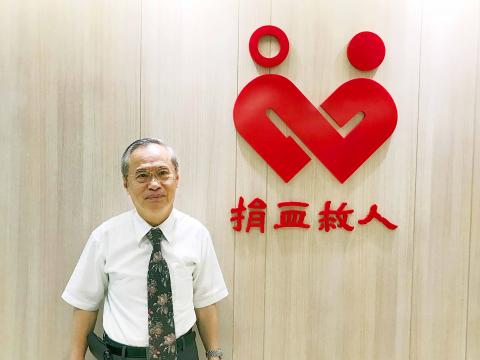The Taiwan Blood Services Foundation is to start before the end of the year a trial run of blood donations from people aged 65 to 70 with an eye to petitioning the government to ease regulations on donor eligibility.
Given an aging population, Taiwan is faced with the dilemma of an ever-increasing demand for blood for transfusions, while its number of eligible young donors declines, the foundation said.
Raising the age limit for donors is an option to boost the nation’s blood supply, foundation chairman Hou Sheng-mao (侯勝茂) said in an article published in the Taiwan Medical Journal.

Photo: CNA
The US, Canada and other nations have been pushing the same measure, as elderly people have the lowest risk for blood-transmitted diseases, he wrote.
As of last year, Taiwan had a blood donation rate of 7.55 percent, which is higher than the average 4 to 5 percent in other countries, the foundation said.
Annual donations reach about 2.5 million bags of 250ml each, with the figure rising steadily, it said.
However, demand is also surging: From 2014 to last year, it rose 4 percent from 2.22 million bags of blood to 2.31 million bags, foundation statistics showed.
Donors were mainly older people, with those aged 41 to 65 contributing 799,000 bags, while donations by younger people, aged 17 to 30, decreased from 629,000 bags to 535,000 bags, the data showed.
Lagging supply leads to a rapid depletion of stored plasma during natural disasters, foundation consultant Lin Tung-tsan (林東燦) said.
Fit and healthy older people have been calling on the government to ease donor restrictions, Lin said.
According to the Food and Drug Administration’s (FDA) Standards for the Health of Blood Donors (捐血者健康標準), people over 65 years old who wish to donate blood must obtain a doctor’s permission and present proof of health.
The trial’s aim is to raise the age cap for donors to 70, with an accompanying clause that they must have donated blood within the past two years without experiencing any discomfort, the foundation said.
It marks the first time in 18 years that the country is discussing whether to relax regulations on donor age, Lin said.
The trial run would impose a maximum donation of 250ml per session, but would allow males to donate up to four times a year — up from three — while platelet donation would remain the same at one unit per session, not fewer than four weeks between sessions and no more than 12 times a year, Lin said.
After a trial run of one to two years, the foundation hopes to present the results and petition the FDA to raise the age limit for donors, it said.
FDA drug division official Huang Mei-chen (黃玫甄) said that the agency would not preclude such discussions.

A preclearance service to facilitate entry for people traveling to select airports in Japan would be available from Thursday next week to Feb. 25 at Taiwan Taoyuan International Airport, Taoyuan International Airport Corp (TIAC) said on Tuesday. The service was first made available to Taiwanese travelers throughout the winter vacation of 2024 and during the Lunar New Year holiday. In addition to flights to the Japanese cities of Hakodate, Asahikawa, Akita, Sendai, Niigata, Okayama, Takamatsu, Kumamoto and Kagoshima, the service would be available to travelers to Kobe and Oita. The service can be accessed by passengers of 15 flight routes operated by

Chinese spouse and influencer Guan Guan’s (關關) residency permit has been revoked for repeatedly posting pro-China videos that threaten national security, the National Immigration Agency confirmed today. Guan Guan has said many controversial statements in her videos posted to Douyin (抖音), including “the red flag will soon be painted all over Taiwan” and “Taiwan is an inseparable part of China,” and expressing hope for expedited reunification. The agency last year received multiple reports alleging that Guan Guan had advocated for armed reunification. After verifying the reports, the agency last month issued a notice requiring her to appear and explain her actions. Guan

GIVE AND TAKE: Blood demand continues to rise each year, while fewer young donors are available due to the nation’s falling birthrate, a doctor said Blood donors can redeem points earned from donations to obtain limited edition Formosan black bear travel mugs, the Kaohsiung Blood Center said yesterday, as it announced a goal of stocking 20,000 units of blood prior to the Lunar New Year. The last month of the lunar year is National Blood Donation Month, when local centers seek to stockpile blood for use during the Lunar New Year holiday. The blood demand in southern Taiwan — including Tainan and Kaohsiung, as well as Chiayi, Pingtung, Penghu and Taitung counties — is about 2,000 units per day, the center said. The donation campaign aims to boost

The Central Weather Administration (CWA) said a magnitude 4.9 earthquake that struck off the coast of eastern Taiwan yesterday was an independent event and part of a stress-adjustment process. The earthquake occurred at 4:47pm, with its epicenter at sea about 45.4km south of Yilan County Hall at a depth of 5.9km, the CWA said. The quake's intensity, which gauges the actual effects of a temblor, was highest in several townships in Yilan and neighboring Hualien County, where it measured 4 on Taiwan's seven-tier intensity scale, the CWA said. Lin Po-yu (林柏佑), a division chief at the CWA's Seismological Center, told a news conference